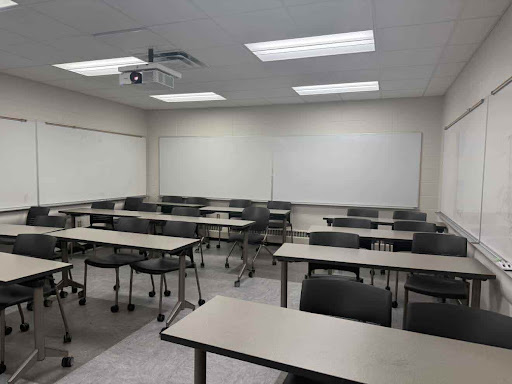Next year Indiana students will have to put their cell phones away in class, under the Senate Enrolled Act 185, which was signed into law by governor Eric Holcomb and will take effect this summer. The bill is unclear as it does not provide a set of rules to follow, but instead lets the districts make up the rules. The only requirement is that in some way communication devices are no longer allowed in class. The set of procedures, enforcement and disciplinary action is all up to districts to decide. Many teachers have different opinions on the bill.
As a teacher what is your opinion on the Phone Ban Bill?
Math Teacher Kevin Reed: I think it’s an overreach and difficult to police. High school is a time when students take more responsibility for their education. Prior to this time, students will progress through the grade levels even if they fail certain courses. In high school, should they fail a course, they take it again. A high school student can choose how to use their phone responsibly, if they allow their phone to be a detriment to their learning, then they face the consequences, just as if they choose not to pay attention in class or complete their assignments.
Chinese Teacher Chunmei Guan: Some teachers might have concerns about how strictly such a ban would be enforced and whether it might infringe on students’ rights or hinder their ability to use technology for educational purposes. It’s important to consider how the ban would be implemented and whether there are alternative strategies for managing phone use in the classroom that could be equally effective without resorting to a complete ban.
English Teacher Jitka Nelson: I do, however, have some questions when I think about how the new policy, when we have one, will be enforced.
The bill states ” (b) As used in this section, ‘wireless communication device’ means any portable wireless device that has the capability to provide voice, messaging, or other data communication between two (2) or more parties, including a: (1) cellular telephone; (2) tablet computer; (3) laptop computer; or (4) gaming device.
The language is conflicting to me. We want our students to use laptops, but the laptops have the capability to communicate, do they not? Additionally, more and more students own smartwatches, and those also belong to the category of “portable wireless devices”, and they also communicate, right? Therefore, at this time I have more questions about what the implementation of the new law will look like in the classroom than I have answers.
How might this affect the life of a student?
Guan: Potential challenges with implementation. While the intent behind the phone ban may be positive, there could be challenges in enforcing it consistently across all classrooms and ensuring that students comply with the policy. Teachers may need to develop clear guidelines and consequences for phone use to effectively implement the ban.
Reed: For the students that are academically-driven, they will still perform but irritated. The students who just really don’t care will likely continually talk with their neighbors and/or cause disruptions for others. The students in the middle will either perform better or join the students who just don’t care.
As a teacher will this bill make your life easier or harder?
Reed: Overall harder. I feel like I will be policing this, I’m not a policeman, on a daily basis. This will take away class time for the ones who wish to learn and try to avoid confrontations.
Do you find phones as a distraction in your classroom?
Reed: Mostly no. Most students respect my request to put their phones down during review and instruction. They all put their phones away during tests and quizzes. I do allow students to listen to music while they work on their classwork, but some may do just a bit more which is not worth the fight.
Is there a point to this bill?
Reed: I believe the bill was designed, with good intentions, to improve student learning. In my mind, this bill will not do that. To improve student learning this requires reworking the current standards/courses required to graduate from high school. I feel these current standards/courses are somewhat more appropriate for those who attend college. Many students do not and see no sense in this and I agree with them. As a math teacher, having all students become an academic in the current math standards is like requiring them to be an auto mechanic and I would fail miserably. Why don’t we nudge students to things they are good at and require the appropriate courses?
Do you think this bill does more harm than good?
Nelson: The bill is just that, the bill. What we do with the bill, meaning the policy we adopt and the way we enforce it, has the potential for diverse outcomes, and time will tell. Personally, I am more about teaching students to use technology responsibly rather than prohibiting it. I am sure that the lawmakers’ mean well, but I also know that forbidden fruit is the sweetest.














